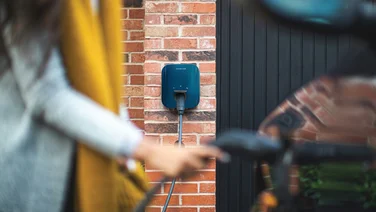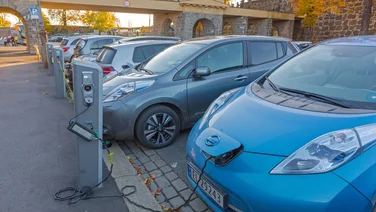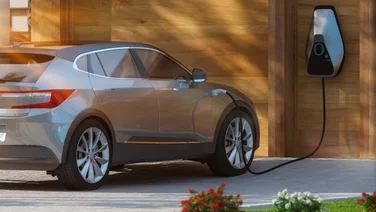✔ It costs around half as much to run an electric car as a petrol car, on average
✔ Some of the most popular electric cars have lower than average premiums
✔ Installing a home charger could save you thousands of pounds
An electric car is the vehicle of the future – a way to get around without fanning the flames of climate change. But money makes the world go round, and you don’t want to make this investment without knowing the costs involved (such as the price of installing an electric charger).
There’s also the cost of charging the car itself.
Thankfully, we’ve got you covered on that front – and if you’d like to start saving straight away, just fill in this form to see how much a charging station would cost you.
Get free EV charging point quotes
Answer a few quick questions, and our trusted installers will send you bespoke EV charging point quotes – for free.

Cost of running an electric car vs a petrol car
The average cost of running a 100% electric car is 9p per mile, according to the our calculations – and some of the latest vehicles run at even cheaper prices.
In contrast, the average petrol car will cost you 19p per mile to drive.
That means petrol vehicles are around twice as expensive as electric cars, despite high electricity prices.
The size of this disparity changes depending on which model you drive, but electric cars are the clear winner.
The low cost of running an electric car is encouraging a rapidly increasing number of people to buy one.
For more information on how much cheaper electric cars are in the long run, check out our Electric Vehicle Statistics page.
Despite the cost benefits of owning an electric vehicle, only 55% of people would have an EV if it were free, according to our National Home Energy Survey.
Electric vehicle savings calculator
Cost of charging an electric car at home
Charging your car at home will always be your most convenient option.
In the same way you power up your phone before leaving for a day of taking on the world, you can soup up your car and go wherever, whenever.
Charger
Buying and installing a home charger usually costs around £1,000, but some top chargers are available for lower prices.
You can see all the best models for you in our article on the best electric vehicle home chargers.
Electricity
From there, the costs are relatively minimal.
The distances you can drive vary wildly between different models, but 220 miles is the average for electric vehicle ranges.
At a little over 9p per mile, that means you’ll pay £19.72 per full charge.
The average driver travels 6,800 miles per year – about 19 miles per day – which would cost around £610 in an electric car – or less, with a newer model.
For a more personalised figure, please use the electric vehicle cost calculator above.
Tariff
The average cost of electricity is 28.62p per kWh (kilowatt-hour), but the amount it costs you to charge your car will of course depend on the tariff you use.
Have a look at your electricity bill – or even call your energy company – to make sure you’re not paying more than you need to.
And when you’re looking for a public charger, make sure you find as low a tariff as possible. It’ll save you hundreds of pounds in the long run.
If you discover that you’re paying too much, the Energy Switch Guarantee should ensure that you can move suppliers without too much stress.
Cost of charging an electric car at public stations
Some public charging stations are free – an incentive left over from when it was extremely hard to convince people to go electric.
But because electric vehicle ownership is rising in the UK, free chargers are disappearing.
And when these public stations do cost money, they’re often much more expensive than other options.
The standard price of public charging is now 50.57p per kWh, and in many locations you’ll need to pay a subscription or one-off charge on top of that.
BP Pulse, for instance, charges users an annual fee, then 59p to 79p per kWh to use a sufficiently quick charger.
On average, you’ll pay £1,077 per year to charge in public, compared to just £610 if you charge at home.
You can also use supermarket charging points – the full, updated list is in our guide, How Much Does It Cost to Charge an Electric Car at Tesco and Other Supermarkets?
Are electric cars cheaper to insure?
On average, electric cars are still slightly more expensive to insure – but this will depend on your model, and the costs are coming down every year.
For instance, three of the five most popular electric cars attract lower average premiums than the nationwide annual average of £755, according to a Compare the Market study.
The Nissan Leaf, Smart Forfour Passion, and Renault Twizy Colour are all cheaper than the average, which marks a milestone in insurance for electric vehicles.
Electric cars were definitely more expensive when they first entered the mainstream, as insurers couldn’t create risk assessments without historical data.
They played it safe, hiking up premiums or just refusing to create policies for electric vehicles – but this is changing as electric cars become more common, and prices are coming down.
It’s become clear that a battery pack is both simpler to repair and less likely to be damaged in a crash than a petrol engine – and what’s more, electric cars aren’t stolen as often.
Multiple studies have demonstrated this fact, including one report from the Highway Loss Data Institute, published by CNBC, that found Tesla vehicles are about 90% less likely to be stolen than the average car.
They’re also more likely to be recovered, because charging them takes expertise and forward-planning. A car thief can’t just take your electric car to any old petrol station.
Speaking to What Car? magazine, a GoCompare spokesperson said that “green cars are becoming increasingly mainstream, meaning that more and more insurers are looking at providing policies.
“As the number of insurers goes up, the cost is likely to fall. With electric car insurance, it’s more important than ever that you don’t simply auto-renew at the end of a year.”
How to access electric vehicle chargers
There are a number of companies who own the UK’s charging stations. If you decide against getting a home charger, they offer various plans.
Be warned, though – you’re likely to pay much more with one of these subscriptions than if you install a chargepoint at home.
Gridserve
Gridserve (formerly known as Ecotricity) operates around 300 charging stations across the UK.
It costs at least 39p per kWh to power up your car, which means their stations are always more expensive than the average home’s electricity.
BP Pulse
Access to BP Pulse chargers (previously known as Polar) costs £7.85 per month, but even after this payment – which adds up to £94.20 per year – you’ll still pay to use most of the company’s 7,000 charging stations.
It costs 55p or 59p per kWh to use a charger that won’t take several hours, which makes becoming a member even less attractive.
Source London
This is one of a diminishing number of regional networks in the UK.
It makes more sense than a nationwide plan if you barely ever drive out of London, as it offers lower prices.
For a £4 per month subscription, you can access around 1,000 charging points all over the capital, either for 39p per kWh in your borough, or 47p per kWh outside your borough.
Over a year, you’ll pay £875 on average, which is 43% more than charging at home.
Other regional networks such as Source East, Charge Your Car, and D2N2 (which serves Derbyshire and Nottinghamshire) have been absorbed into BP’s Chargemaster brand.
Summary
An electric car costs considerably less to charge and run than a petrol car, especially if you install a home charging station, or if your workplace offers free chargers.
Otherwise, you’ll be forced to use expensive public charging stations which will eradicate most of the savings you’ll make by going electric.
Going green is great, and it makes financial sense too. Getting a home charger could save you thousands over the lifetime of your electric car. If you’re tempted, fill in this form to see how much it would cost you.






